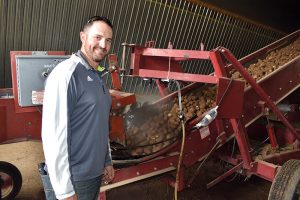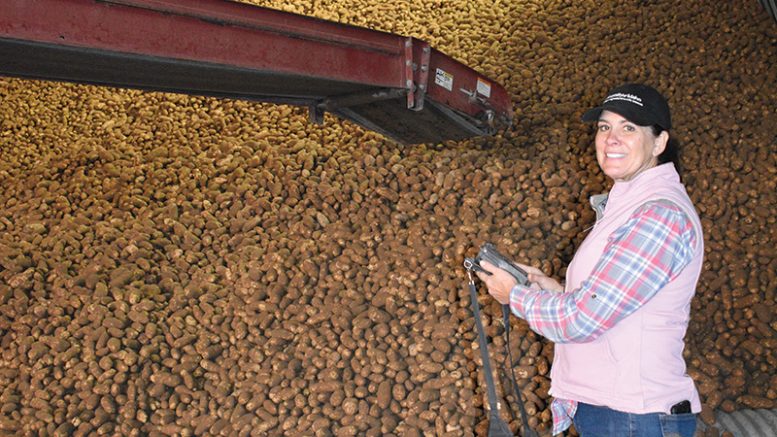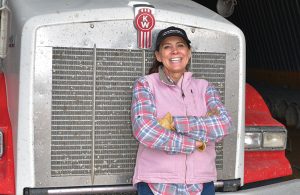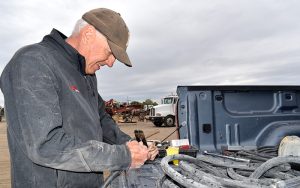Story by Allen Thayer Photos by Dave Alexander, Publisher
Mary Hasenoehrl looks back on her first year as the first woman representing growers on the Idaho Potato Commission (IPC) with satisfaction.
“It has been good,” she says. “The potato industry is critical to Idaho, and I felt I could offer help in that area by promoting Idaho potatoes. It was a learning curve the first six or seven months. Now I feel I’m contributing. I went to the National Restaurant Association Show in Chicago and helped promote Idaho potatoes at our booth and spoke with industry people from Canada and the United States.”
Hasenoehrl next will attend the IPC’s annual Big Idaho Potato Harvest Meeting on Nov. 14 at Shoshone-Bannock Hotel and Event Center in Fort Hall.
“It’s for all the potato growers to attend and discuss issues and learn what the IPC has done for them,” she says.
Frank Muir, IPC president and CEO, says the meeting brings various industry leaders together for a single post-harvest event to discuss the growing season, field trends and forecasts and research.
Idaho Potato Commission
The nine-member IPC marketing board is a state agency formed in 1937. It’s responsible for promoting and safeguarding the Idaho potato brand. Of the nine commission members, five are grower representatives, two are potato shipper representatives, and two are potato processor representatives.
Hasenoehrl’s IPC district stretches from western Idaho to the Northern Panhandle.
Gov. Butch Otter appointed Hasenoehrl as just the second woman to serve on the board of directors. She joins current board member Peggy Arnzen, an official with Rexburg-based Bench Mark Potato, who represents fresh shippers.
The IPC’s main initiative is “Grown in Idaho,” a collective trademark program for marketing Idaho-grown potatoes and accompanying advertising campaigns. Its efforts are funded by an assessment of 12.5 cents per every 100 pounds of potatoes Idaho farmers grow. It has a budget of $15 million.
Hasenoehrl serves as chairman of the IPC Research Committee. Part of the money collected from assessments goes to fund research.
“We work with different universities and private researchers to find solutions to some of our needs,” she explains, adding that priorities include problems posed by certain viruses and insects.
“Each year, we meet about three different times,” Hasenoehrl says. “The first time we meet, we look at all the proposals submitted by researchers and determine which ones we want to pass off to the larger group to vote on.”
That process began at the end of October.
Gross Farms, Inc.
Hasenoehrl was raised on a small farm in Midvale and has been involved in agriculture for most of her life. She and her husband, Doug Gross, are partners in more than 560 acres of potatoes on their Wilder farm.
“We raise about 40 million pounds of processed potatoes, which includes Bannock, Ranger and Clearwater and 4 million pounds of Russet Norkotah potatoes for the fresh market,” Hasenoehrl shares. “We also raise some corn occasionally and wheat, but our main crop is potatoes. We have a four-year crop rotation.”
“Doug started helping his dad when he was in grade school, and then in college started renting ground from him and then buying his own ground,” she says.
They also reside in Lewiston, where her sons lease her dryland native grass seed farm. Hasenoehrl became the first female Port of Lewiston Commissioner President in 2011 and is running unopposed in November to retain her seat. Lewiston is home to Idaho’s only seaport.
Hasenoehrl and Gross met after their spouses died. Her first husband was killed in a farming accident. About a year after that, Gross lost his wife. Hasenoehrl reached out to Gross, letting him know she understood what he was going through. They married in 2014.
“It’s a long, hard road,” Hasenoehrl says. “I have sympathy for anybody who has to go through that. We’ve formed relationships where we’re free to talk about memories of our deceased spouses with our kids and with each other. We both loved and respected our first spouses very much, and I think that built a strong foundation for where we are now. We know what it takes to have a successful marriage. We feel very blessed that we found each other.”

Anthony Molitor with Industrial Ventilation, Inc. checks on spuds being sprayed with a BioSafe product as they go into storage at Gross Farms.
CLICK TO READ 5 MINUTES WITH MARY HASENHOEHRL




